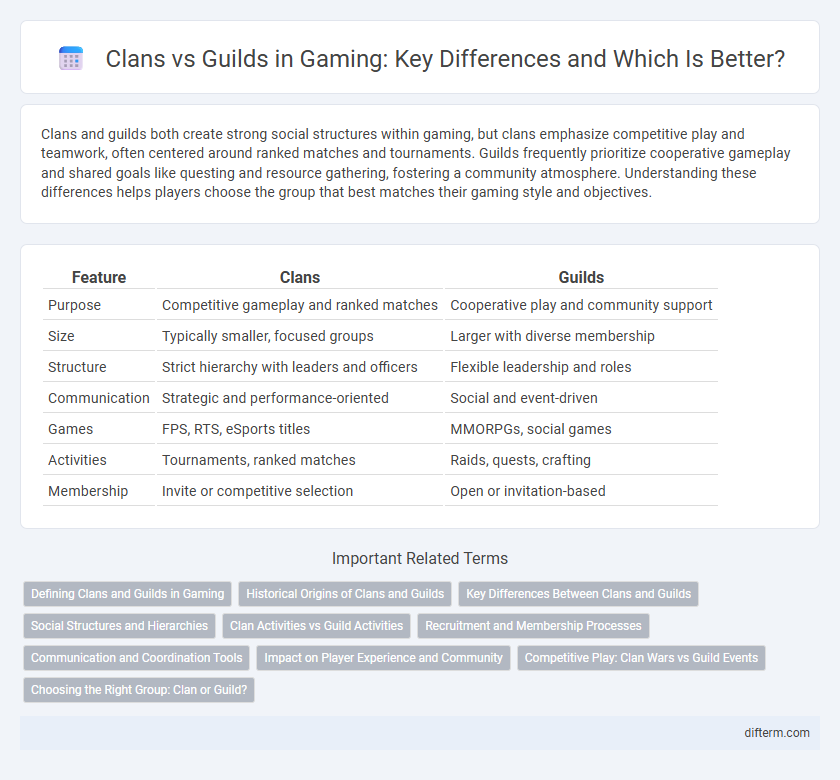Clans and guilds both create strong social structures within gaming, but clans emphasize competitive play and teamwork, often centered around ranked matches and tournaments. Guilds frequently prioritize cooperative gameplay and shared goals like questing and resource gathering, fostering a community atmosphere. Understanding these differences helps players choose the group that best matches their gaming style and objectives.
Table of Comparison
| Feature | Clans | Guilds |
|---|---|---|
| Purpose | Competitive gameplay and ranked matches | Cooperative play and community support |
| Size | Typically smaller, focused groups | Larger with diverse membership |
| Structure | Strict hierarchy with leaders and officers | Flexible leadership and roles |
| Communication | Strategic and performance-oriented | Social and event-driven |
| Games | FPS, RTS, eSports titles | MMORPGs, social games |
| Activities | Tournaments, ranked matches | Raids, quests, crafting |
| Membership | Invite or competitive selection | Open or invitation-based |
Defining Clans and Guilds in Gaming
Clans and guilds in gaming are organized groups of players that collaborate to achieve common goals, with clans typically emphasizing competitive play and small, tight-knit teams. Guilds often concentrate on social interaction and cooperative gameplay within massively multiplayer online role-playing games (MMORPGs), providing resources, support, and coordinated strategies. Understanding these differences is crucial for gamers seeking specific community experiences or competitive advantages in titles like World of Warcraft or Call of Duty.
Historical Origins of Clans and Guilds
Clans and guilds both originated in medieval societies, with clans primarily forming as kinship-based groups in Scotland and Ireland, focusing on family allegiance and territorial defense. Guilds emerged in European cities during the Middle Ages as organized associations of artisans and merchants, established to regulate trade practices, maintain quality standards, and protect economic interests. These historical foundations influence their gaming counterparts, where clans emphasize social bonds and guilds center on collaborative achievement and resource management.
Key Differences Between Clans and Guilds
Clans and guilds both serve as player groups in gaming, but clans primarily emphasize competitive play and team-based strategy, often participating in tournaments and ranked matches. Guilds typically focus on cooperative gameplay, social interaction, and collective progression, especially in MMORPGs where members collaborate on quests, raids, and resource sharing. Key differences include organizational structure, with clans often maintaining strict hierarchy and skill requirements, whereas guilds prioritize inclusivity and community-building.
Social Structures and Hierarchies
Clans in gaming typically emphasize competitive social structures with clear hierarchies based on skill and rank, fostering teamwork during ranked matches and tournaments. Guilds often prioritize collaborative play and community building, featuring flexible leadership roles and inclusive hierarchies that encourage player participation in cooperative quests and events. Both clans and guilds serve as social hubs, but clans focus on competitive prestige while guilds center around collective progression and camaraderie.
Clan Activities vs Guild Activities
Clan activities typically center around competitive gameplay such as ranked matches, clan wars, and tournaments that emphasize teamwork and strategy in real-time. Guild activities often include cooperative quests, resource sharing, and large-scale raids focused on community-building and collective progression within the game. Both clans and guilds foster social interaction, but clans prioritize competitive objectives while guilds concentrate on collaborative and role-playing elements.
Recruitment and Membership Processes
Clans often streamline recruitment with open or invitation-only systems, prioritizing active players and specific skill sets to maintain competitive rosters. Guilds typically implement structured membership processes involving trials, applications, or recommendations, fostering tighter community bonds and coordinated group activities. Understanding these distinct approaches helps gamers choose communities aligned with their playstyle and social expectations.
Communication and Coordination Tools
Clans and guilds utilize specialized communication platforms such as Discord and TeamSpeak to facilitate real-time voice and text interactions, enhancing teamwork during gameplay. Coordinated event scheduling and strategy planning tools, including shared calendars and tactical bots, streamline member participation and execution of missions. Effective communication and coordination technologies directly impact team performance, fostering competitive advantage in multiplayer gaming environments.
Impact on Player Experience and Community
Clans and guilds both significantly enhance player experience by fostering teamwork and social interaction, though clans often emphasize competitive gameplay while guilds prioritize cooperative and role-playing elements. The impact on community dynamics varies, with clans creating tight-knit groups focused on rankings and achievements, whereas guilds nurture inclusive environments encouraging collaboration and long-term engagement. These differences shape player loyalty and contribute to diverse social ecosystems within gaming platforms.
Competitive Play: Clan Wars vs Guild Events
Clan wars emphasize coordinated team strategies and real-time combat skills, driving intense competitive play with structured objectives and territorial control. Guild events often prioritize cooperative gameplay through timed challenges, resource gathering, and player-versus-environment missions that reward community participation. Both formats foster player engagement but cater to different competitive interests: clans thrive on direct PvP battles, while guilds excel in collaborative PvE activities.
Choosing the Right Group: Clan or Guild?
Choosing the right group in gaming depends on playstyle and goals, as clans often emphasize competitive gameplay and teamwork, while guilds focus on social interaction and cooperative quests. Clans typically feature strict hierarchy and organized events, appealing to players seeking high-level competition and rankings. Guilds provide a more relaxed environment with diverse activities, ideal for gamers wanting camaraderie and casual collaboration.
clans vs guilds Infographic

 difterm.com
difterm.com